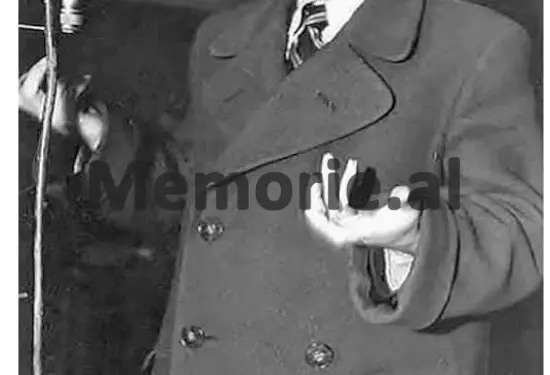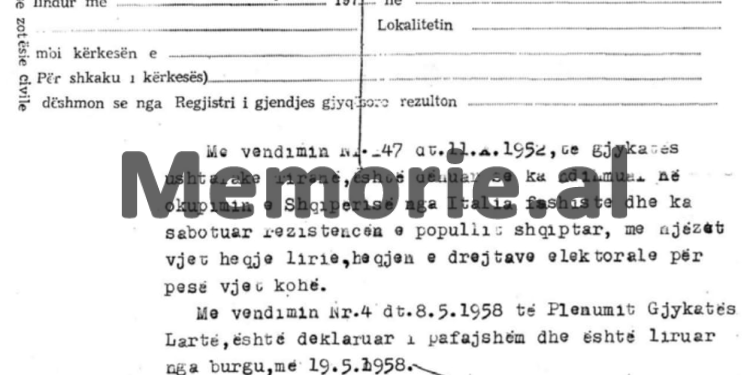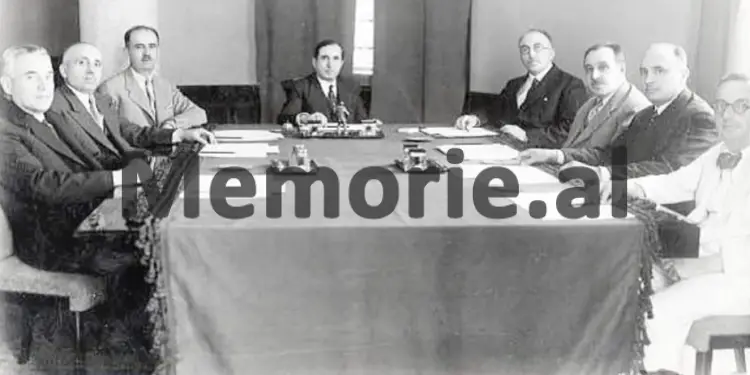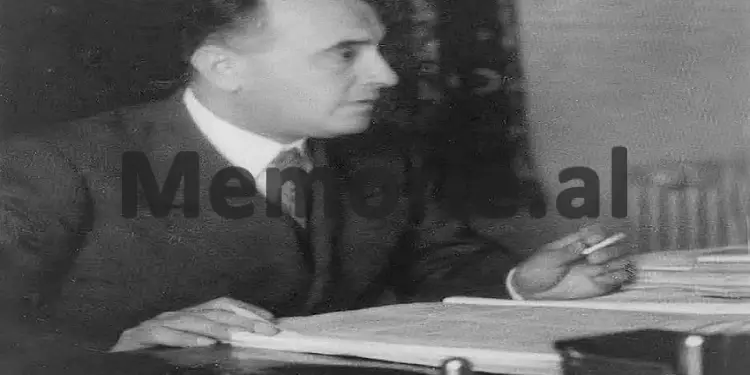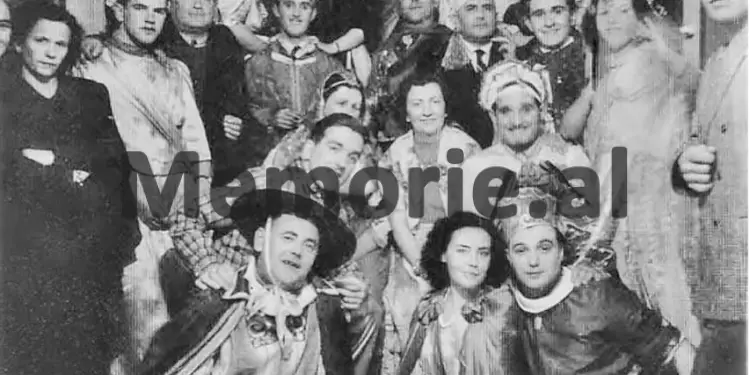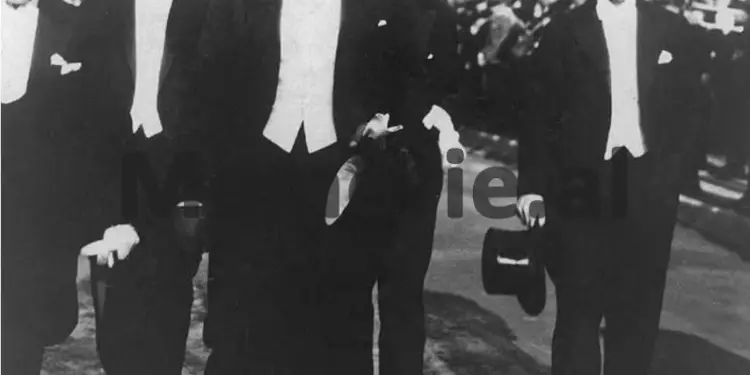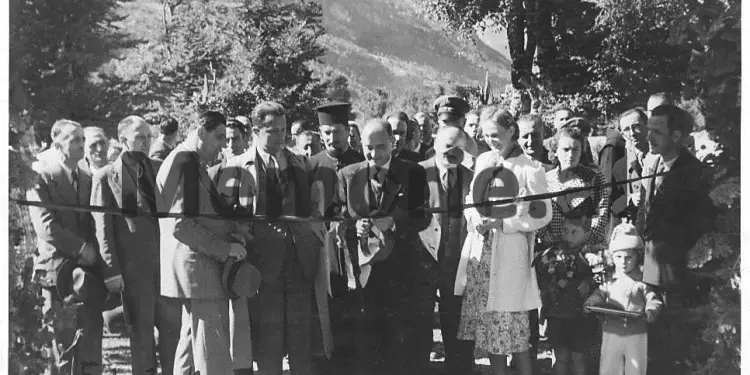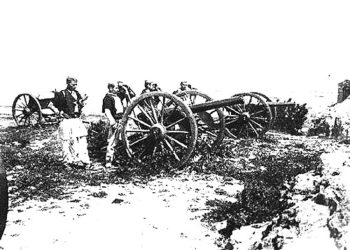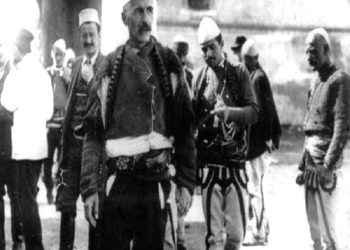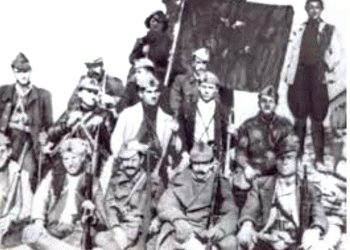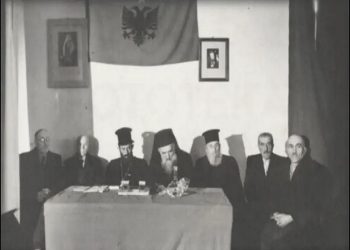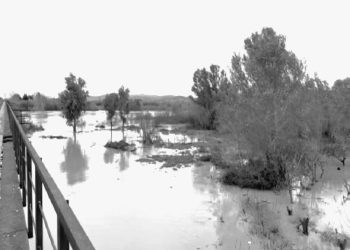By Arben Pustina
Part nineteen
-Rrok Gera, a proper statesman –
FORWARD
Memorie.al / This article aims to convey to the public the image of a perfect man, who lived in other times, but who was the best example, not only of what an ordinary man can represent, but, next first, as an example of a noble, distinguished, omniscient and, above all, honest statesman. Having in his genes the noble virtues of his origin, being formed as a personality in a wonderful environment, such as Shkodra at the beginning of the 20th century, and graduating from one of the most prestigious universities in Europe, such as that of In Vienna, Rrok Gera had all the potential to be one of the important figures who gave rise to a rapid development through comprehensive reforms in Albania in the 30s of the last century.
This development reached its peak with the government of Mehdi Frashër, considered perhaps the best Albanian government of all time, formed for the most part by non-political persons, among who was Rrok Gera. For 10 years, or more, as a minister or in other high state functions, he worked with conviction that he was walking on the right path for the consolidation of the Albanian state, a process for which he said he had no time to lose. Economist, financier, diplomat, lawyer, Gera was a specialist who advanced towards the top with his professionalism in an environment where the old factions, which were almost dominant in politics and governance, lost ground in front of young and educated people good.
Continues from last issue
RROK GERA, MINISTER OF FINANCE IN THE GOVERNMENT HEADED BY FIQIRI DINE, IN 1944
Finding himself in this situation that, as we said above, he had not even imagined, Rrok Gera first thought of withdrawing, since, as expressed in his letter to Prime Minister Dine, as well as later in the letter to Regent Frashëri, to ‘faced with the financial situation in the country, one person was needed; with the prerogatives of a dictator, but he was not and could not become one. However, Gera, as we will see below, continued his activity as finance minister in the Dine government, focusing on the project for the nationalization of the BKSh.
Another problem was the strong pressure from the Germans, who several times had given ultimatums, demanding direct funding for their troops in Albania, or issuance of new banknotes by the National Bank of Albania. Otherwise, they threatened to launch their own brand of invasion. Aware of the serious consequences that would have for the Albanian economy and finances, accepting the German ultimatums, the Albanian governments of 1944, especially the finance ministers (among them Rrok Gera), tried to eliminate the worst, dragging the issue as best they could. As is known, for its financing at that time, the German army was forced to sell large amounts of gold coins in Albania.
According to Lorenzo Jaselli, in order to meet their financing needs, the Wermacht troops brought about 500,000 gold Napoleons to Albania, which they then sold to Albanian private individuals. Regarding this fact, Jaselli quotes Amadeo Gambino, who had underlined in one of his articles, that this flow of monetary wealth that the Germans brought to Albania was probably a unique circumstance for all the countries occupied by Germany during the Second World War. Meanwhile, from the end of August, Rrok Gera judged that the moment had come for the Council of Ministers to consider in its meeting the draft law “On the declaration of the repeal of the Convention dated March 15, 1925 and on the expropriation for public benefit of the shares of the National Bank of Albania”, otherwise called “Bill for the nationalization of the National Bank”.
In reserve letter no. 140, dated August 23, 1944, addressed to the Presidency of the Council of Ministers, Minister Gera demanded the approval of this draft law as soon as possible: “…Based on the discussions developed over time, we have drawn up the joint project on the nationalization of the National Bank of Albania. We pray that after the project in question is studied by the P.T. Ministerial Council and approved, it urgently takes the necessary steps to change it into law. Sincerely: Minister of Finance Rrok Gera”
The project envisioned the cancellation of the 1925 agreement with the Italian financial group, expropriating for public benefit the National Bank of Albania and creating the Albanian Bank in its place. Also, it was predicted that the capital of this bank would be 12.5 million Albanian francs, divided into 595 thousand shares, of which 100 thousand with 1.25 Albanian francs and 495 thousand shares with 25 Albanian francs each. So, the Bank would have Albanian and foreign shares and depending on the Albanian side, there would be 341,550 shares, of which 49 thousand shares with 1.25 Albanian francs each and 292,550 shares with 25 Albanian francs each.
A small part of these shares would be owned by the state and the overwhelming part would be owned by an Albanian company, which would not have foreign shareholders in its bosom. The Italian financial group would own 178,450 shares, of which 51,000 shares at 1.25 Albanian francs each and 127,450 shares at 25 Albanian francs each. The Swiss financial group would own 50,000 shares of 25 francs each and, finally, the Belgian financial group with 25,000 shares of 25 Albanian francs each. The Bank’s Administrative Council would consist of 12 people, of which 7 would be Albanians, 3 Italians, 1 Swiss and 1 Belgian.
The President of the Bank was always going to be Albanian.277 Unfortunately, things did not go as expected, as the Italian leaders of the Bank had taken measures to undermine the project in question, a project that Gera had been trying to implement for some time. . On August 28, 1944, Rrok Gera, Minister of Finance, persistently defended at the meeting of the Council of Ministers his proposal for the nationalization of the Bank, which provided for the transfer of a part of the shares in favor of Albania, but, seeing the determined opposition of majority of the members of the government, requested that at least the document remain in the acts, as proof of the efforts of the then government for the benefit of the country’s economy.
In the end, the draft law was defeated, wasting months of intensive work and negotiations, above all, rejecting a project of great interest for the development of the country. The diaries of the Central Directorate of the Central Bank of Albania reflect in detail the behind-the-scenes for the overthrow of the draft law for the nationalization of this Bank, a overthrow that had as protagonists very well-known names of Albanian history, quoted in these diaries, with initials:
“… Saturday, August 5, 1944 … in the morning we had the visit of the F.b.A. who informed us about the result of his intervention in the issue of the Bank’s nationalization, both with the chairman of the Council of Ministers and with the foreign minister. The former had assured him that no final solution would be taken with regard to the Bank, without first thoroughly studying the problem with competent persons.
(F.b.A is referring to the complete ignorance of the problem on the part of F.D, which, among other things, thought that the banking agreement signed after April 7, 1939 was in force). While the second, E.b.V., had ruled out participation in the Bank’s nationalization project as presented, ensuring in the most formal way, that such a project would never have his signature. In the evening T.T. gives us a copy of the memorandum with which he thought to reject the well-known draft law for the nationalization of the Bank.
A copy of this memorandum was presented to F.D. and another copy was presented by T.T. to Regent P.A.’278 “Monday, August 7, 1944 …F.b.A. comes to visit Dr. Melis to inform him that he had a further discussion with F.D. on the nationalization of the Bank. F.D. would thank him for drawing his attention to thus warn him of the possibility of adopting matters contrary to the interests of the country.
F.D. adds that E.b.V. had declared to him that he would never put his signature on a decree for the nationalization of the Bank, which would be contrary to the agreement of 1925, and thus would tarnish the good name of the Albanian state”. “Monday, August 28, 1944 ..E.b.V. pays a visit to Dr. Melis to inform him that on one of these days Minister G. (Rrok Gera – St. im, A.P.), had presented the draft law for the nationalization of the Bank to the Council of Ministers for review and approval.
Strongly defended his proposal, emphasizing that even if the project was not carried out, it would still be appropriate for the case to remain on the record as evidence of the steps taken by this government to achieve a very useful goal for the country’s economy. Starting from the same argument, E.b.V. it would demonstrate on his part the inadequacy to undertake at these moments, actions that, while remaining platonic, would not bring any advantage to the country, but on the contrary, would be a prejudice for future relations with Italy.
E.b.V. communicated to us that despite the approval of another member of the government, G.’s proposal was rejected. Always according to the diaries of the Central Directorate of the Central Bank of Bulgaria, during a meeting held with Ettore Meliss, on September 2, 1944, the minister E.b.V confidentially informed the senior official of the Bank that in one of the meetings of the Council of Ministers, minister Gera had affirmed to him that he continued to have a grudge against the Central Bank, but in the meantime he had underlined that he could not help but appreciate the high level of the managers of this Bank.
Expressed ironically or not, Gera seems to have understood what had happened, but perhaps he did not realize that such a large number of high officials had conspired against his initiative. In one of the last meetings as Minister of Finance, held on September 4, 1944, with the leaders of the BKSh, Meliss and Bressan, Rrok Gera had seen fit to make a firm statement and in a rather energetic form had emphasized to the Italians regarding his efforts to nationalize the Bank that, in the first place, he had tried to fulfill his duty to his country:
“…as a statesman, he had the duty to worry first of all about the interest of Albania, in all directions, and he was forced many times, to achieve the goals for the good of the country, to act in a way that perhaps the leaders to the Italians of the Bank, it seemed unsympathetic…”. Faced with a rather turbulent situation in the country, following a meeting held on the afternoon of August 28, 1944, the Fiqiri Dines government resigned, when about 40 days had passed since its creation.
As it was said in the relevant announcement forwarded to the media by the Albanian Telegraphic Agency, the prime minister and the ministers admitted that it was impossible for them to fulfill the commitments of the program announced in July, which were mainly about protecting the integrity of the borders and ensuring public order. On this occasion, Prime Minister Dine addressed a letter to the Presidency of the Nalte Council, where he presented the reasons for the resignation of the government: “…Unfortunately, the external circumstances and the sad internal events during this month of government activity, have given You gave the government the proof that it can no longer hope to succeed in these main points of its program.
The armed forces for the defense of the Motherland, destroyed by the legacy of foreign rule, are not and cannot be able to fulfill this task. Ensuring public order, destroyed by external anti-national propaganda, by uprisings and by the destruction caused by murder, can no longer be established with the means available to the Government.
The good will of a part of the people for calming the spirits and for the unity of all Albanians in these unfortunate moments for the Motherland was completely missing. In the face of these facts, the Government that I have the honor to lead and myself, unfortunately, cannot continue to bear the burden of responsibility for a situation that was caused outside of our will, which is the inheritance of misfortunes, disagreements, ill will and to foreign powers that are beyond our regulatory capabilities”.
After handing over the office, sometime around September 6, Rrok Gera returned to his home in Shkodër, thus ending his career as a statesman. He was only 43 years old.
SPECIAL TRIAL 1945, SENTENCE AND RELEASE FROM PRISON WITH INNOCENTNESS, LAST YEARS OF LIFE.
Convinced of the purity of his image, Rrok Gera did not try to leave the country in the fall of 1944, although at that time many personalities left Albania, in order not to fall into the hands of the regime that was being installed in the country. In January 1945, he was arrested and in February-April of that year he was tried together with about 60 other personalities in the Special Court held in Tirana.
Rrok Gera, who was defended in this trial by lawyer Karapici, had no witnesses against him, while witnesses in his favor were: Gjergj Kokoshi, Dhimitër Pasko, Petro Popa, Perikli Spiro, engineer Xega, engineer Truja and Andon Nesturi. Meanwhile, the People’s Prosecutor, Bedri Spahiu, gave the claim, according to which all the defendants had committed anti-national and anti-people activities, both before April 7, in preparing the ground for the occupation of Albania by the forces of fascist Italy, and during the occupation. Italian and German.
In his last speech, after giving the claim, Rrok Gera once again emphasized his attitude towards the accusations made against him: “I add that since April 7, 1939, until July 20, 1944, I have not been involved in politics. When I became a minister for a short time, it was not my desire and will, but imposed by the circumstances. I admit I was wrong. I never intended to work against the interests of the people…”.
On April 13, 1945, the Special Court, presided over by Lieutenant General Koçi Xoxe, handed down the verdicts for all the accused. Sentences ranged from death to probation. In its decision for a group of defendants, including Rrok Gera, the Court stated, among other things, that “… after April 7, 1939, they actively collaborated with the Italian fascist occupier; accepted the annexation of Albania under the force of the personal union, created a puppet government, fascistized the country in various ways: agitation, propaganda, etc.
Rrok Gera put all the Albanian armed forces at the disposal of the enemy, mobilized the Albanian people in the war against neighboring countries and big democracies…”. The Special Court sentenced Gera to 10 years in prison and forced labor. For him as well, as for all those sentenced to more than 5 years in prison, the court ordered the confiscation of movable and immovable property, in accordance with the legal provisions in force, and the loss of civil and political rights. But less than a year later, there was an amnesty for Rrok Gera, through which 5 years of prison were deducted from his sentence and he was released in November 1949. /Memorie.al
The next issue follows




